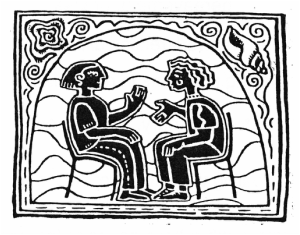|
What can I expect?
Therapy offers you protected time, set aside especially to look at the questions and issues that have brought you and the concerns that matter to you. As a counsellor I rarely offer advice and will not direct you as to what you should do in your life. Instead I work to help you to clarify your experiences and situation and the different options open to you. What is explored in our meetings will be decided by you; you remain 'in the driving seat' as it were. Therapy may involve talking about life events (current or from the recent or distant past) and how they may have shaped or be affecting the person you are now. It can include exploring your emotions, relationships, and patterns of thinking and behaving. It can involve becoming clearer about the external factors in your life which are affecting you. It may include exploring things on the edge of your awareness, which are not yet fully clear to you and which may make themselves felt in subtle ways, such as in your dreams, or unexplained physical ailments. I would aim to listen to you supportively, fully, and actively; to respond to you in order to help you explore all that you chose to share; together identifying the way forward - either to find responses to or resolution of the difficulties or to discover ways of accommodating them that are satisfactory for you. Grant me the serenity to accept the things I cannot change, Courage to change the things I can, And wisdom to know the difference. Reinhold Niebuhr (1892–1971) Therapy can help you to understand yourself and your situation more clearly, perhaps from new and surprising perspectives. It can help you develop your own strengths and inner resources. Talking about things may take time, and will not necessarily be concluded quickly. You may find that one, two, or a few sessions are enough for you or you may prefer to continue over a considerably longer period of time. You can of course choose to stop counselling at any point; you do not have to give a reason. However it can be a very helpful and rewarding part of the therapeutic process to anticipate and plan the ending together; to talk about it, and to reflect together on the work that has been done. In my work, through dialogue with you, I would continually attempt to tailor my approach to what fits for you most helpfully at any given time. Therapy is one form of help amongst others and is certainly not a panacea for life's ills. In the first meeting you have the opportunity to discuss whether it is right and fitting for you at this point in your life. Emma Cameron, a colleague in England, identifies Twelve Things You Need To Know about your initial meeting. Therapy cannot provide 'ready-made' or 'magic' answers to our problems and whilst supportive, is an unfolding process which can involve very difficult and challenging experiences. Therapy rarely offers progress in a straightforwardly linear way, and it is not uncommon for the process to involve sometimes feeling worse before feeling better. Part of my role is to support you through these unfamiliar processes. For more information about Counselling and Psychotherapy generally you may find the following links helpful: The British Association for Counselling and Psychotherapy provides a range of information sheets and offers clear advice about what to look for and questions to ask when seeking a therapist and beginning therapy. COSCA - Counselling and Psychotherapy in Scotland is the organisation for Counselling and Psychotherapy specifically in and for Scotland. COSCA has produced a short introductory film about counselling called Person to Person which you can view here. |
'We think we listen, but very rarely do we listen with real understanding, true empathy. Yet listening, of this very special kind, is one of the most potent forces for change that I know'. 'A number of incidents helped me to experience the fact that it is the client who knows what hurts, what directions to go, what problems are crucial, what experiences have been deeply buried. It began to occur to me that unless I had a need to demonstrate my own cleverness and learning, I would be better to rely upon the client for the direction of movement in the process'. Carl Rogers |

